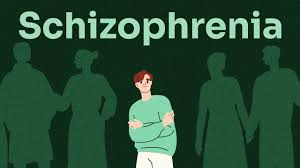Navigating Schizophrenia: Understanding and Overcoming the Mental Health Challenge
by twib

Schizophrenia: Understanding the Complex Mental Health Condition
Schizophrenia is a serious and often misunderstood mental health disorder that affects how a person thinks, feels, and behaves. It is not a split personality or multiple personalities, as commonly portrayed in media, but rather a complex condition that can have a significant impact on an individual’s life.
Symptoms of Schizophrenia
The symptoms of schizophrenia can vary widely from person to person and may include:
- Delusions – false beliefs that are not based in reality.
- Hallucinations – seeing or hearing things that others do not.
- Disorganized thinking and speech.
- Difficulty concentrating.
- Emotional flatness or lack of expression.
- Social withdrawal.
- Cognitive deficits affecting memory and decision-making.
Treatment and Management
While there is no cure for schizophrenia, it can be effectively managed with a combination of medication, therapy, and support services. Antipsychotic medications are commonly prescribed to help control symptoms, while therapy can assist individuals in coping with the challenges of the disorder and improving their quality of life.
Understanding the Stigma
Unfortunately, stigma surrounding schizophrenia still exists in society, leading to discrimination and barriers to treatment. It’s essential to educate ourselves about mental health conditions like schizophrenia and promote empathy and understanding towards those affected by it.
Seeking Help
If you or someone you know is experiencing symptoms of schizophrenia, it’s crucial to seek help from a qualified mental health professional. Early intervention and treatment can make a significant difference in managing the condition and improving overall well-being.
Understanding Schizophrenia: Symptoms, Diagnosis, Causes, Treatment, and Support
- What are the symptoms of schizophrenia?
- How is schizophrenia diagnosed?
- What causes schizophrenia?
- Is schizophrenia treatable?
- How can I support a loved one with schizophrenia?
What are the symptoms of schizophrenia?
One of the most frequently asked questions about schizophrenia revolves around its symptoms. The symptoms of schizophrenia can manifest in various ways, including delusions, hallucinations, disorganized thinking and speech, difficulty concentrating, emotional flatness, social withdrawal, and cognitive deficits affecting memory and decision-making. Understanding these symptoms is crucial in recognizing the signs of schizophrenia and seeking appropriate help and support for individuals experiencing them.
How is schizophrenia diagnosed?
Diagnosing schizophrenia involves a comprehensive evaluation by a qualified mental health professional, typically a psychiatrist or psychologist. The process often includes a thorough assessment of the individual’s medical history, symptoms, and behavior. Diagnostic criteria outlined in the Diagnostic and Statistical Manual of Mental Disorders (DSM-5) are commonly used to identify schizophrenia. Additionally, physical exams, laboratory tests, and imaging studies may be conducted to rule out other medical conditions that could be causing the symptoms. A precise diagnosis is crucial for developing an appropriate treatment plan tailored to the individual’s needs and ensuring effective management of the disorder.
What causes schizophrenia?
The exact cause of schizophrenia is not yet fully understood, as it is believed to result from a combination of genetic, environmental, and neurobiological factors. Research suggests that individuals with a family history of schizophrenia may have a higher risk of developing the disorder, indicating a genetic predisposition. Additionally, factors such as prenatal exposure to viruses, complications during birth, and early childhood stress or trauma may also contribute to the development of schizophrenia. Furthermore, imbalances in neurotransmitters in the brain, particularly dopamine and glutamate, are thought to play a role in the manifestation of symptoms associated with this complex mental health condition.
Is schizophrenia treatable?
Schizophrenia is a treatable mental health condition, although it requires ongoing management and support. While there is no cure for schizophrenia, a combination of medication, therapy, and other support services can help individuals effectively manage their symptoms and improve their quality of life. Early intervention is key in the treatment of schizophrenia, as it can lead to better outcomes and increased stability. It’s important for individuals living with schizophrenia to work closely with healthcare professionals to develop a comprehensive treatment plan tailored to their specific needs. With the right support system in place, many individuals with schizophrenia can lead fulfilling and productive lives.
How can I support a loved one with schizophrenia?
Supporting a loved one with schizophrenia can be challenging but crucial for their well-being. It’s essential to educate yourself about the condition, listen without judgment, and offer your unconditional support. Encouraging them to adhere to their treatment plan, such as taking medication and attending therapy sessions, can make a significant difference. Providing a safe and understanding environment, being patient during difficult times, and involving them in social activities can also help enhance their quality of life. Remember that your support and empathy play a vital role in helping your loved one navigate the complexities of schizophrenia with dignity and resilience.
Schizophrenia: Understanding the Complex Mental Health Condition Schizophrenia: Understanding the Complex Mental Health Condition Schizophrenia is a serious and often misunderstood mental health disorder that affects how a person thinks, feels, and behaves. It is not a split personality or multiple personalities, as commonly portrayed in media, but rather a complex condition that can have…
Latest articles
- Embracing the Legacy: Ireland Rugby’s Enduring Passion and Pride
- The Cricketing Genius of Kane Williamson: A True Maestro of the Game
- Kate Abdo: A Trailblazer in Sports Broadcasting
- Julius Randle: A Rising Star in the Australian Basketball Scene
- Artists Unveiled: Celebrating Creativity and Expression
